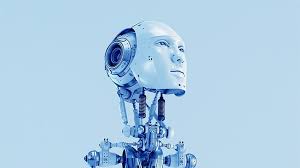I have tried, since I first heard the term, to stay away from artificial intelligence.
The problem is, artificial intelligence won’t stay away from me.
If AI is not recommending an alternate restaurant to the one I was planning to dine at, it’s offering to rewrite my social media posts. It’s either driving my car for me, or trying to plan my next vacation. If it’s not suggesting a better title for my upcoming book, it’s using chatbots to locate my missing luggage. The latter failed incidentally.
Now AI thinks it’s funnier than I am.
Since 1989 I have been a full-time stand-up comedian. Making strangers laugh is difficult for sure but not nearly as tough as developing the material. I spend hours a day at my laptop creating, writing, deleting, and rewriting ideas that become jokes. My goal is to meld together a series of jokes into “bits,” so my act is not a series of random, disjointed one-liners, but a collection of stories about particular topics that I discuss via a seamless array of segues, giving audience members the perception that I’m just having a funny, 60-minute conversation with them.
And you thought comedians just slept until 3 p.m., worked an hour and spent the evening’s remainder trying to get phone numbers of every waitress in the club.
Artificial Intelligence Can Take It From Here
So imagine my dismay when, as I was typing a comment accompanying an Instagram photo, AI offered to take over. It could take that comment and “rephrase,” “shorten,” “make supportive” or “make funnier.”
Didn’t I just explain there’s more to comedy than just “making it funny”?
Curious, I relented. The picture in question featured some high school friends who had attended a recent performance. The photo was on my phone, and one friend requested I forward it to her. I did as instructed, but first increased the exposure since the photo was shot in a dark comedy club. Before hitting “send,” I added the message “I lightened it up a bit” and then clicked “make funnier.”
AI’s response? “I tweaked it to make it less likely to induce a coma from boredom.”
Are you convulsing with laughter? Did you just spit liquid out your nose? Do you need to stop and collect yourself before reading further?
Didn’t think so.
If my laptop were a comedian, I would have heckled it.
Incidentally, AI’s “make supportive” suggestion was, “I made some adjustments to enhance its engagement and prevent it from becoming too dull.”
I’m sure my friend’s mental health would drastically improve after digesting that line.
ChatGPT Will Know for Sure
I could have spent hours reading AI’s miserable attempts at humor. But, as previously mentioned, creating comedy requires time. So I cut to the chase. Using ChatGPT, the AI-driven consumer application that uses large language models (LLMs) to answer questions, I posed the following query:
“Is Greg Schwem funnier than artificial intelligence?”
Granted, the response was far quicker than the time it takes me to craft a joke.
“Greg Schwem is a professional stand-up comedian known for his corporate comedy, blending humor with insights about technology and the workplace. He’s widely regarded for his relatable and clean humor, which resonates well with live audiences, particularly in corporate settings.
“As for whether he’s funnier than artificial intelligence, humor can be subjective. AI-generated humor can be clever and surprising due to its vast knowledge base and pattern recognition. However, it often lacks the personal touch, timing and delivery that human comedians like Greg Schwem bring to their performances. Comedy from a live performer can adapt to the audience’s reactions, making it feel more engaging and spontaneous.
“Ultimately it depends on what you find funny. Schwem’s humor may resonate more with those who appreciate human experience and delivery, while AI might appeal to those intrigued by the unexpected or novel use of language.”
Not exactly a glowing recommendation, but one that leaves me hopeful that my fellow comedians and I will always be preferred to computers when it comes to laughter. I never want to see the day when customers file into a club featuring a computer onstage, spitting out “jokes” and making the audience think performing comedy is easy. Sadly, that’s already been done with music.
It’s called karaoke.




The F-Bomb Has Gone Mainstream — And Nobody Cares Anymore